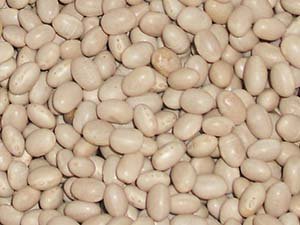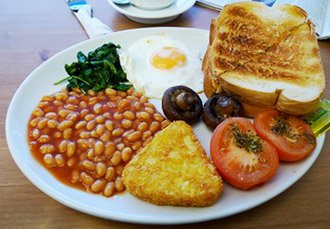Navy beans (Haricot) Nutrition facts
Navy beans, also known as Boston Pea beans or haricot beans, are a subspecies of white beans in the Fabaceae family of legumes. They are among the most sought-after beans in North America and Europe due to their wholesome nutritional properties.
Binomially, navy beans belong to common bean cultivars in the Fabaceae family and the genus: Vigna.
Scientific name: Phaseolus vulgaris.
 |
| Navy (Haricot) beans. |
The navy bean is a small bush-type plant that thrives in well-draining, sandy soil with adequate moisture. Similar to other white bean cultivars such as Great Northern and white kidney beans, the navy bean is also a short-duration crop, taking 70-90 days from seedling to harvest.
Each cylindrical bean pod typically contains about 4-7 seeds. Navies are small, plump, cowpea-sized, oval beans, slightly flattened and encased within a thin white skin. When boiled, navy beans have a fine, buttery texture and a pleasant, sweet beany taste.
Soissons
These large white haricot beans are generally considered the prize of the bean family in France.
9 Amazing Health benefits of Navy (Haricot) beans
100 grams of navy beans provide 354 calories and 22.33 grams or 40% of the recommended daily allowance of protein.
Unlike soybeans, navy (haricots) contain only small amounts of isoflavones antioxidants. The total value of isoflavones is 0.27 mg per 100 grams of beans, with daidzein and genistein at levels of 0.01 mg and 0.20 mg respectively. Isoflavones have been found to reduce post-menopausal cancers and osteoporosis.
Haricots (navy) contain relatively fewer amounts of dietary fiber than white beans. Nonetheless, they have higher fiber content than lentils and some green beans. Dietary fiber acts as a bulk laxative, protecting the colon mucosa by decreasing exposure time to toxic substances and binding to cancer-causing chemicals in the colon.
Dietary fiber has been shown to reduce blood cholesterol levels by decreasing the reabsorption of cholesterol-binding bile acids in the colon.
These beans do not contain gluten protein, making them preferred protein-rich gluten-free food alternatives for individuals with gluten allergy and celiac disease.
Navy beans are excellent sources of many B-complex vitamins such as folates, pyridoxine, thiamin (vitamin B-1), pantothenic acid, riboflavin, and niacin. Most of these vitamins act as co-factors for enzymes in carbohydrate, protein, and fat metabolism.
Dry navy beans contain 364 μg of folates (94% of DV). Folate, along with vitamin B-12, is an essential co-factor for DNA synthesis and cell division. Adequate folate in the diet around conception and during pregnancy may help prevent neural tube defects in babies.
The beans are also rich in minerals. 100 grams of dry navy beans provide 15% of calcium, 69% of iron, 62% of manganese, 58% of phosphorus, and 33% of zinc.
Additionally, 100 grams of navy beans contain 1185 mg or 25% of potassium, an essential electrolyte of cells and body fluids that helps counter the pressor effects of sodium on heart and blood pressure.
.
| Principle | Nutrient Value | Percent of RDA |
|---|---|---|
| Energy | 337 Kcal | 17% |
| Carbohydrates | 60.75 g | 47% |
| Protein | 22.33 g | 40% |
| Total Fat | 1.50 g | 7.5% |
| Cholesterol | 0 mg | 0% |
| Dietary Fiber | 15.3 g | 40% |
| Vitamins | ||
| Folates | 364 μg | 91% |
| Niacin | 2.188 mg | 13% |
| Pantothenic acid | 0.744 mg | 15% |
| Pyridoxine | 0.428 mg | 33% |
| Riboflavin | 0.164 mg | 13% |
| Thiamin | 0.775 mg | 65% |
| Vitamin A | 0 IU | 0% |
| Electrolytes | ||
| Sodium | 5 mg | <1% |
| Potassium | 1185 mg | 25% |
| Minerals | ||
| Calcium | 147 mg | 15% |
| Copper | 0.834 μg | 93% |
| Iron | 5.49 mg | 69% |
| Magnesium | 175 mg | 44% |
| Manganese | 1.418 mg | 62% |
| Phosphorus | 0.407 mg | 58% |
| Selenium | 11 μg | 20% |
| Zinc | 3.65 mg | 33% |
| Phyto-nutrients | ||
| Daidzein | 0.01 mg | |
| Genistein | 0.20 mg | |
| Biochanin A | 0.02 mg |
Selection and storage
Both dry and canned navy (haricot) beans are readily available in shops across the US and Canada. Opt for well-packed, dry, uniform-sized white beans to ensure consistent soaking and cooking times. Avoid beans with broken, cracked, or cut surfaces, as they may not hold up well once boiled or canned.
Dry navy beans can be stored for several months. At home, store them in an airtight plastic or metallic container and place them in a cool, dry location away from high temperatures and humidity.
Preparation and serving methods
Navy beans are highly desired among white bean varieties in the USA, Canada, and Europe.
Cooking typically involves soaking in cold water for 3-5 hours. They cook more quickly than other white bean varieties and can be boiled and simmered for 1 hour, or pressure cooked for 20 minutes (for soaked beans) or 20-30 minutes (for unsoaked). Soaking and boiling also eliminates anti-nutritional compounds and reduce flatulence.
Here are some serving tips:
 |
| Baked haicot beans. Photo: Ewan munro |
Navy beans are featured in the renowned Boston baked beans recipe and the traditional Senate Bean Soup in the US.
Typically, navy beans are boiled for dishes and mashed for dips.
Navy (haricot) beans are commonly used in soups and stews, combined with complementary herbs, spices, and vegetables.
Caldo gallego, a traditional Galician soup, incorporates navy beans, cabbage, collard greens, turnip greens, and potatoes.
Boiled haricot beans are mixed with chopped tomato, parsley, onion, and seasoned with lemon juice and olive oil to create delicious bean salads.
Soissons (large navy beans) are also a primary ingredient in the slow-cooked casserole known as cassoulet in French cuisine, which includes Toulouse sausage, lamb, and preserved goose, topped with a layer of breadcrumbs.
Safety profile
Consuming raw, soaked navy beans can lead to phyto-hemagglutinin (lectin) toxin poisoning, a condition that may result in the clumping of red blood cells in humans. Symptoms can include nausea, vomiting, and diarrhea.
Cooking navy beans in a pressure cooker eliminates these toxins and makes them safer. (Medical disclaimer).
You may also like to read≻≻-
Flageolet beans nutrition facts and health benefits.
Adzuki beans nutrition facts and health benefits.
Chickpeas nutrition facts and health benefits.
Lima beans nutrition facts and health benefits.
fava beans nutrition facts and health benefits.
≻≻-Back to Legumes from Navy Beans nutrition. Visit here for an impressive list of vegetables with complete illustrations of their nutrition facts and health benefits.
≻≻-Back to Home page.
Further Resources: